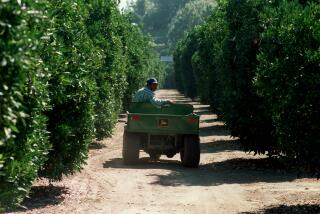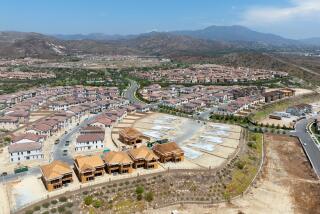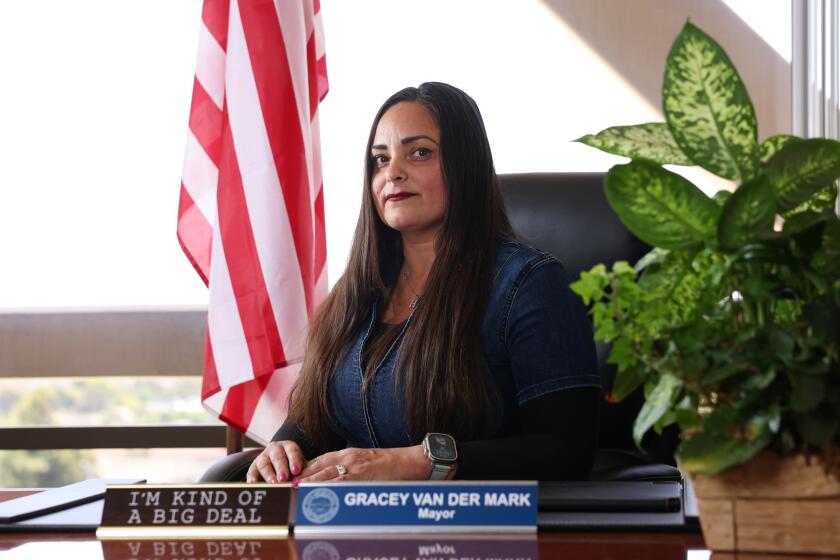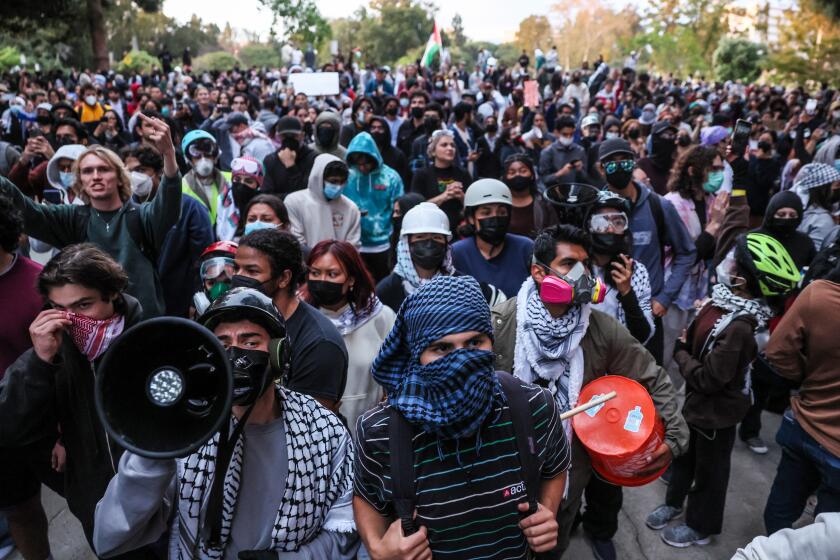Final pieces of Irvine Ranch complete ‘open-space puzzle’ in O.C.
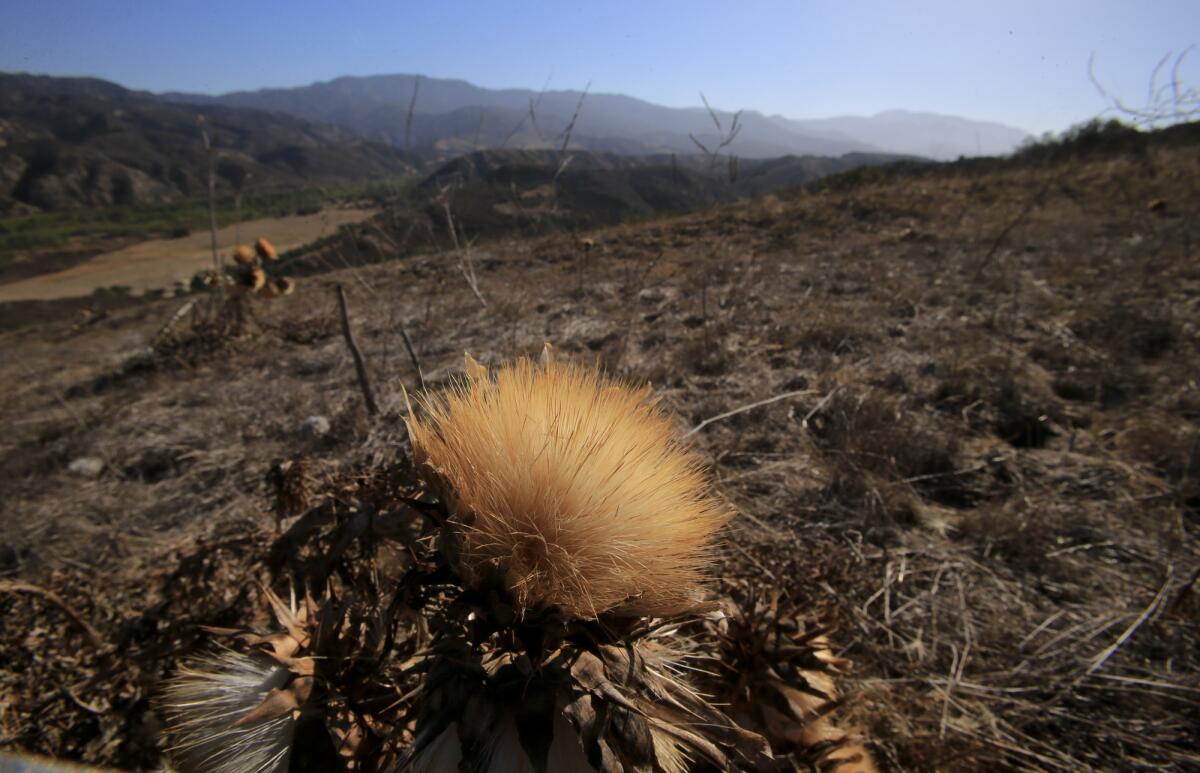
The GMC Yukon bounces past a barbed-wire fence and up a dry, grassy hillside — the brush scratching loudly against its underside as it heads toward the ridge.
Below, the parched hills roll out in rust- and khaki-colored swatches, and Irvine Lake is blue and glassy in the morning sunlight.
“It’s funny to think that just over the hill is civilization,” says Mike Lyster, a spokesman for the Irvine Co., which owns this rugged landscape.
This spot in eastern Orange is now part of a proposed 2,500-acre gift from the Irvine Co. to Orange County — 1,400 acres here and an additional 1,100 in Anaheim Hills.
The properties represent the final slices of the historic Irvine Ranch that will be put into public hands and completes the landholding company’s master plan for what was once a landscape of wide-open grasslands and canyons that stretched across the face of the county.
Much of the ranchland, more than one-fifth of the county’s 798 square miles, has become picturesque suburban neighborhoods and aggressively manicured shopping centers.
But with the 2,500-acre gift, more the half of the old 93,000-acre ranch that stretched from Newport Beach to the Santa Ana Mountains will be open space and parkland used by bicyclists, hikers and horseback riders.
“The lands represented by this new gift are last pieces of a spectacular open-space puzzle that has been assembled on the Irvine Ranch,” Michael O’Connell, executive director of the Irvine Ranch Conservancy, said in a statement. The nonprofit works with the county to manage the land.
Through the decades, the Irvine Co. has granted pieces of the ranch to the county as open space preserves. Most recently, in 2010, the company donated 20,000 acres in the same area as the new gift. In total, the company says, 55,000 acres will be preserved, including the lake, Black Star Canyon, Limestone Canyon and Irvine Regional Park.
As with past land grants, the 2,500-acre deal won’t become final until the county accepts the donation. The terms of acceptance are the subject of negotiations between the company and the county aimed at ensuring there are resources to manage the land. In 2010, for instance, the Irvine Co. gave the independent nonprofit Orange County Parks Foundation $4 million to help pay for land management.
Unlike the 2010 land gift, though, which largely had already been set aside as protected open space, the acreage the Irvine Co. is now handing over was essentially shovel-ready for 5,500 homes.
“We could go down and pull a permit today and build,” said Daniel Miller, Irvine Co. senior vice president of entitlement and public affairs.
Why would the company give up prime real estate in a county that’s nearly built out?
Irvine Co. officials say the decision largely traces to company Chairman Donald Bren, whom Forbes called “the wealthiest real estate developer in the U.S.”
Open space, company officials say, is a major facet of Bren’s utopian vision for the communities he’s helped build and shape.
“He believes it’s important not to just build houses,” Miller said. “Mr. Bren is always looking at the overall master plan.”
An Irvine Co. website titled “Forever” — the word emblazoned over photos of wildlife and poster-worthy landscapes — details how the master plan has guided land preservation “for present and future generations.”
That kind of long-range planning sets the Irvine Co. apart from other major developers, Miller said. For example, he said, in 1960 the company transferred 1,000 acres of the ranch for $1 to the University of California to build UC Irvine.
Beyond altruism, the company’s calibrations for maximizing residents’ quality of life are part of a broad financial strategy. Happy residents draw more families looking for a nice community to put down roots. And with happy residents living in nice neighborhoods, property values rise.
That’s why the company held on to the ranchland when other large-scale landholders sold property piecemeal to developers, Miller explained.
“Another developer is going to give you a neighborhood park and call it a day,” he said.
The Irvine Co.’s quasi-governmental role in building communities falls in line with suburban development trends around the country, said Larry Rosenthal, an adjunct faculty member of UC Berkeley’s Goldman School of Public Policy, who teaches housing and urban policy.
When it comes to suburbs, he said, the line between public and private entities has become blurred, with homeowners associations — or, in the case of the Irvine Co., developers — taking on regulatory functions traditionally held by local governments.
But an “idiosyncratic” set of circumstances that led to the company’s growth, coupled with what Rosenthal described as enviably shrewd operations over the years, have made the privately held Irvine Co. unique among the high-volume developers jockeying for position in Southern California.
In the case of the company’s land grants, Rosenthal said: “They have a portfolio of built units. The more those units enjoy open space, the more valuable they’ll be over time.”
County Supervisor Todd Spitzer, whose district encompasses the ranch, said the county’s ties to the company are mutually beneficial.
Though he emphasized that the county is doing its “due diligence” in making sure the public is getting a fair shake with the last land gift, he said the donation is significant.
“At the end of the day, it’s a business decision,” Spitzer said. “I think Mr. Bren knows exactly how he wants to leave the county.”
jill.cowan@latimes.com
Twitter: @JillCowan
More to Read
Get the Latinx Files newsletter
Stories that capture the multitudes within the American Latinx community.
You may occasionally receive promotional content from the Los Angeles Times.
